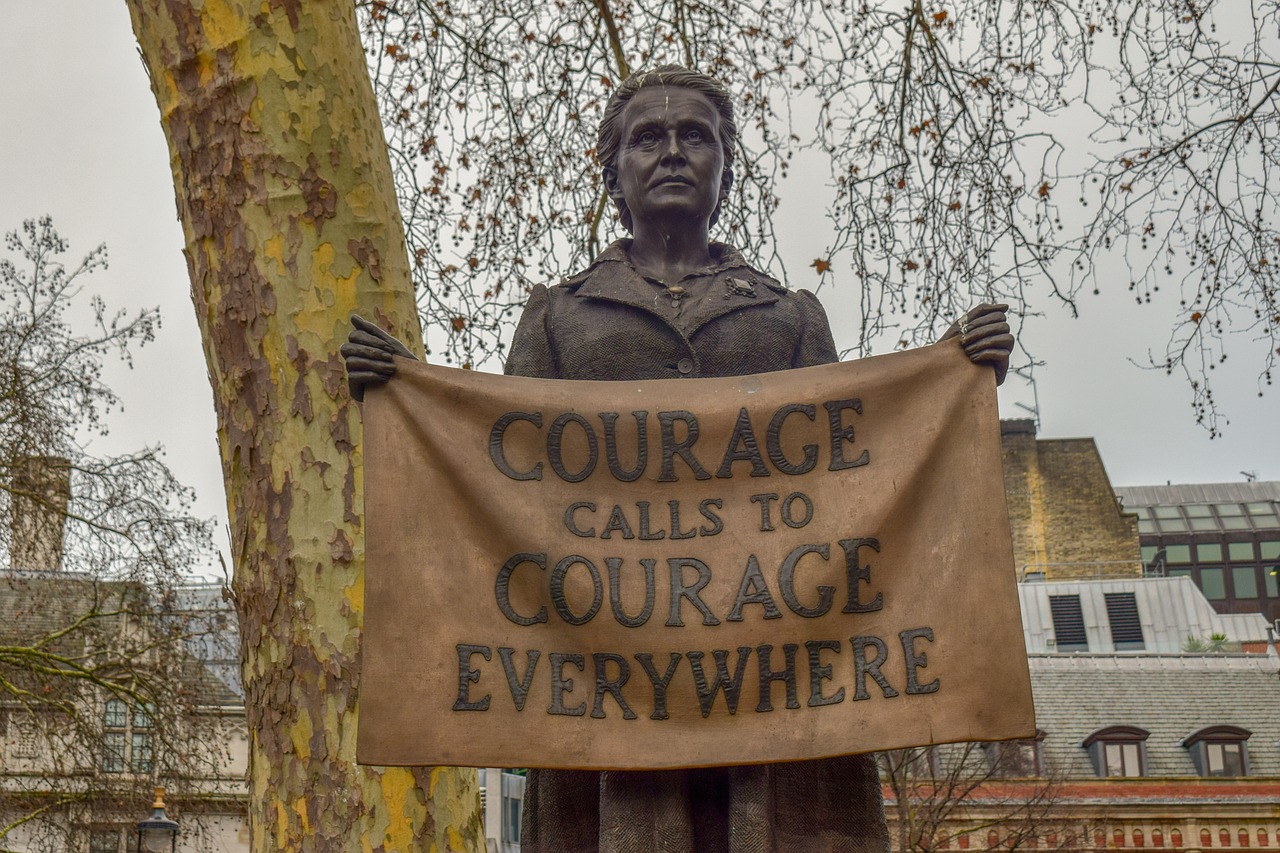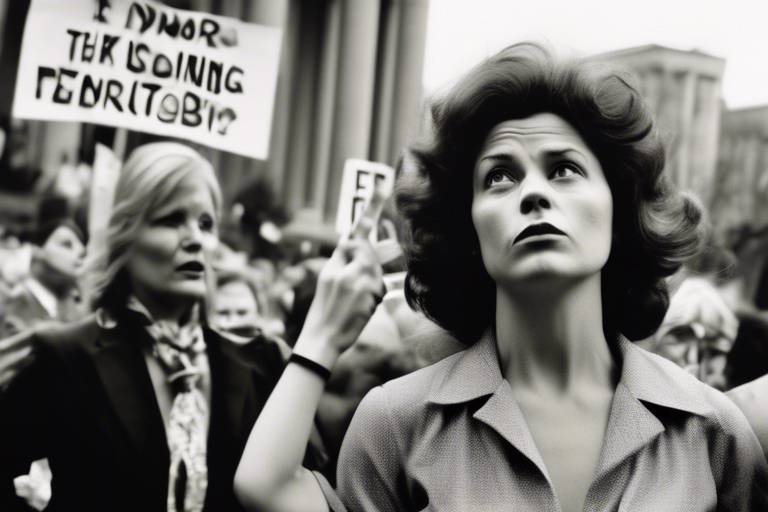Analyzing the Feminist Philosophy of Politics
This article explores the key tenets of feminist political philosophy, examining its impact on contemporary political thought and practice, as well as its critiques and future directions.
Feminist political theory emerged as a response to traditional political philosophies, which often centered on male experiences and perspectives. This movement has been a powerful force in reshaping political discourse, advocating for gender equality and challenging the status quo. By deconstructing the male-centric narratives that have dominated political thought, feminist theorists have highlighted the importance of including women's voices and experiences in political discussions. This inclusion not only enriches the political landscape but also brings to light the systemic inequalities that persist in our societies.
Throughout history, several influential feminist theorists have made significant contributions to the field. Figures like Simone de Beauvoir and Judith Butler have shaped the discourse around gender, power, and politics through their groundbreaking works. Their ideas have not only challenged traditional views but have also paved the way for new understandings of identity and agency in political contexts.
De Beauvoir's seminal work, The Second Sex, laid the groundwork for feminist existentialism. In this influential text, she emphasized the social constructs of gender and advocated for women's liberation in both political and personal spheres. Her assertion that "one is not born, but rather becomes, a woman" has resonated deeply within feminist circles, prompting discussions about the roles women are assigned by society and the need for liberation from these constraints.
De Beauvoir's existentialist philosophy plays a crucial role in her views on identity and agency. By arguing that women can define their own identities rather than accept preordained roles, she reshapes our understanding of women's positions in society and politics. This perspective invites us to consider how existential freedom can lead to genuine political participation and representation for women, challenging the traditional hierarchies that often marginalize their voices.
Despite her profound influence, de Beauvoir's ideas have faced criticism, particularly regarding her views on race and class. Critics argue that her focus on gender often overlooks the complexities of intersectionality, which examines how various social identities interact to shape individual experiences. This critique has prompted further examination of how feminist thought can evolve to be more inclusive of diverse perspectives, ensuring that the struggles of women from different backgrounds are recognized and addressed.
Judith Butler's concept of gender performativity has revolutionized our understanding of gender identity. She challenges the traditional notion that gender is an innate characteristic, suggesting instead that it is constructed through repeated social practices. This idea has significant implications for political representation, as it calls into question the rigid categories often used to define identity in political contexts. By recognizing gender as fluid and performative, Butler opens the door for a more nuanced approach to understanding the complexities of identity in politics.
Intersectionality critiques the oversimplification of women's experiences, emphasizing how race, class, and sexuality intersect with gender to influence political engagement and activism. This framework is essential for understanding the diverse realities faced by different groups of women and the unique challenges they encounter in their political struggles.
Real-world examples of intersectional feminist movements illustrate how diverse experiences shape political agendas and strategies for advocacy. For instance, movements like Black Lives Matter and #MeToo have highlighted the importance of recognizing the interconnectedness of various social issues. By focusing on the unique challenges faced by women of color and those from marginalized communities, these movements have pushed feminist discourse into new territories, advocating for a more inclusive approach to political activism.
Despite its strengths, intersectionality faces challenges, including fragmentation within feminist movements and the difficulty of addressing multiple identities in political contexts. As feminist groups strive to be more inclusive, they must navigate the complexities of differing priorities and experiences, which can sometimes lead to tensions and divisions. Addressing these challenges is crucial for the future of feminist political thought and activism.
As we look to the future, feminist political philosophy continues to evolve. Emerging trends, such as ecofeminism and transnational feminism, are expanding the scope of feminist thought and addressing contemporary issues. These new theoretical frameworks hold the potential to deepen our understanding of the intersections between gender, environment, and global politics, paving the way for innovative approaches to advocacy and activism.
- What is feminist political philosophy? - It is a branch of political theory that examines the role of gender in politics and advocates for gender equality.
- Who are some key figures in feminist political thought? - Influential theorists include Simone de Beauvoir, Judith Butler, and bell hooks.
- What is intersectionality? - Intersectionality is a framework that explores how various social identities intersect and impact experiences of oppression and privilege.
- How does feminist political philosophy impact contemporary politics? - It challenges traditional political narratives and promotes inclusive policies that address the needs and rights of marginalized groups.

The Foundations of Feminist Political Theory
Feminist political theory emerged as a powerful response to the traditional political philosophies that have dominated the discourse for centuries. At its core, this theory challenges the male-centric narratives that have historically shaped political thought and practice. It advocates for gender equality by highlighting the ways in which women have been marginalized in political discussions. The roots of feminist political theory can be traced back to the suffrage movements of the late 19th and early 20th centuries, where women began to demand not only the right to vote but also a voice in the political arena. This movement laid the groundwork for a more comprehensive examination of how gender intersects with power, authority, and governance.
The emergence of feminist political theory was not just about inclusion; it was a radical shift in understanding how politics operates. Traditional theories often overlooked the experiences and perspectives of women, framing political issues through a lens that favored male experiences. Feminist theorists argue that to truly grasp the complexities of political power, one must consider how factors like gender, race, class, and sexuality intertwine. This intersectional approach is crucial for understanding the diverse experiences of women and how their realities shape political engagement.
One of the key tenets of feminist political theory is the critique of power structures. Feminists argue that existing political systems are often designed to maintain the status quo, which predominantly benefits men. This critique extends to various institutions, including government, the legal system, and even family structures. By deconstructing these power dynamics, feminist theorists aim to reveal how societal norms and policies perpetuate inequality.
Moreover, feminist political theory emphasizes the importance of agency and identity. It posits that women are not merely passive victims of oppression but active agents capable of challenging and reshaping their circumstances. This perspective is essential for fostering a sense of empowerment among women, encouraging them to engage in political activism and advocacy. Feminist theorists argue that recognizing women's agency is vital for achieving genuine social change.
As feminist political theory has evolved, it has also become increasingly inclusive, recognizing the importance of intersectionality. This concept, introduced by scholars like Kimberlé Crenshaw, highlights how various forms of oppression overlap and interact. For instance, a Black woman may face unique challenges that are different from those faced by a white woman or a Black man. Understanding these nuances is critical for developing effective political strategies that address the needs of all women.
In summary, the foundations of feminist political theory are built on the principles of equality, critique of power structures, agency, and intersectionality. These tenets not only challenge traditional political narratives but also pave the way for a more inclusive and representative political discourse. As we continue to explore the depths of feminist political philosophy, it becomes clear that its impact is profound, shaping contemporary thought and practice in ways that resonate across various societal dimensions.

Key Figures in Feminist Political Thought
Feminist political thought has been significantly shaped by a number of influential figures who have challenged the status quo and redefined our understanding of gender, power, and politics. These thinkers have not only critiqued traditional political theories but have also introduced new frameworks that advocate for gender equality and social justice. Among the most notable are Simone de Beauvoir and Judith Butler, whose groundbreaking works have paved the way for contemporary feminist discourse.
Simone de Beauvoir, a French existentialist philosopher, is perhaps best known for her seminal work, The Second Sex. In this text, she famously declared that "one is not born, but rather becomes, a woman," highlighting the idea that gender is a social construct rather than a biological inevitability. This assertion has had profound implications for feminist thought, urging women to recognize their potential for agency and liberation in both political and personal realms.
On the other hand, Judith Butler's contributions to feminist theory have revolutionized our understanding of gender identity. Through her concept of gender performativity, Butler argues that gender is not an inherent trait but is constructed through repeated social behaviors and performances. This notion challenges the binary view of gender and opens up discussions about the fluidity of identity, compelling political theorists to reconsider how gender influences representation and participation in political processes.
Both de Beauvoir and Butler have faced their share of critiques, which have further enriched feminist political discourse. For instance, while de Beauvoir's existentialist framework has been praised for its emphasis on individual agency, critics have pointed out its limitations, particularly concerning race and class dynamics. This criticism has led to a broader examination of intersectionality within feminist thought, urging scholars to consider how various identities intersect and influence women's experiences in political contexts.
Butler's work, too, has sparked debates, especially regarding the implications of her ideas for feminist activism. Some argue that her focus on performance can dilute the urgency of addressing systemic inequalities. However, this critique has prompted a more nuanced understanding of how feminist movements can adapt to include diverse perspectives while tackling pressing political issues.
In summary, the contributions of key figures like Simone de Beauvoir and Judith Butler have been instrumental in shaping feminist political thought. Their ideas not only challenge traditional narratives but also invite ongoing discussions about the complexities of gender, identity, and power in the political landscape. As we continue to explore these themes, it becomes clear that feminist political philosophy is not static; it evolves, reflecting the diverse experiences and realities of women across the globe.
- Who is the most influential feminist political theorist? While there are many influential figures, Simone de Beauvoir and Judith Butler are often cited for their significant contributions to feminist political thought.
- What is gender performativity? Gender performativity is a concept introduced by Judith Butler, suggesting that gender is constructed through repeated social practices rather than being an innate quality.
- How does intersectionality relate to feminist politics? Intersectionality critiques the oversimplification of women's experiences by emphasizing how race, class, and sexuality intersect with gender, influencing political engagement and activism.

Simone de Beauvoir's Contributions
Simone de Beauvoir, a towering figure in feminist philosophy, made groundbreaking contributions that continue to resonate in contemporary discussions about gender and politics. Her seminal work, The Second Sex, published in 1949, is often heralded as a cornerstone of feminist thought. In this book, de Beauvoir famously asserts that "one is not born, but rather becomes, a woman," challenging the essentialist views that had dominated prior discourse. By emphasizing the social constructs surrounding gender, she laid the groundwork for feminist existentialism, a philosophy that interrogates the nature of existence through the lens of gender.
De Beauvoir's insights extend beyond mere theory; they actively advocate for women's liberation in both political and personal spheres. She argued that women have been historically relegated to the status of the "Other," a concept that highlights how societal norms and structures have marginalized female experiences. This marginalization is not just a personal issue but a political one, as it affects women's ability to engage meaningfully in political discourse and decision-making. Through her work, de Beauvoir called for a radical rethinking of women's roles in society, urging women to assert their autonomy and challenge the patriarchal structures that confine them.
Moreover, de Beauvoir's exploration of existentialism and gender reveals a profound understanding of identity and agency. She posits that individuals are not bound by predetermined roles; rather, they have the power to define themselves through their actions. This perspective reshapes our understanding of women's roles in society and politics, suggesting that the path to liberation lies in recognizing and embracing one's agency. By advocating for a life lived authentically, de Beauvoir inspires women to break free from societal constraints and pursue their own definitions of success and fulfillment.
However, it is essential to acknowledge that de Beauvoir's ideas are not without criticism. Scholars have pointed out that her focus on gender often overlooks the complexities of race and class. For instance, while she championed the liberation of women, her analysis primarily reflects the experiences of white, middle-class women, raising questions about the inclusivity of her feminist framework. This critique has prompted further examination of intersectionality in feminist thought, urging contemporary feminists to address the multifaceted nature of oppression and the diverse experiences of women from various backgrounds.
In conclusion, Simone de Beauvoir's contributions to feminist political philosophy are both profound and transformative. Her work challenges us to rethink our understanding of gender, identity, and agency, while also prompting critical discussions about the intersections of race, class, and sexuality. As we continue to navigate the complexities of feminist thought, de Beauvoir's legacy serves as a vital foundation for future explorations in the realm of political philosophy.

The Second Sex,
This article explores the key tenets of feminist political philosophy, examining its impact on contemporary political thought and practice, as well as its critiques and future directions.
Feminist political theory emerged as a response to traditional political philosophies, challenging the male-centric narratives and advocating for gender equality in political discourse and practice.
This section highlights influential feminist theorists, such as Simone de Beauvoir and Judith Butler, who have shaped the discourse around gender, power, and politics through their groundbreaking works.
De Beauvoir's seminal work, The Second Sex, laid the groundwork for feminist existentialism, emphasizing the social constructs of gender and advocating for women's liberation in political and personal spheres. In this pivotal text, she famously asserted that "one is not born, but rather becomes, a woman," challenging the idea that gender is a natural state. This assertion sparked a revolution in how we perceive gender roles, urging society to reconsider the deeply ingrained beliefs that dictate women's positions in both public and private life.
This subheading delves into how existentialist philosophy informs de Beauvoir's views on identity and agency, reshaping our understanding of women's roles in society and politics. Existentialism posits that individuals are defined by their actions and choices rather than predetermined essences. De Beauvoir applied this philosophy to argue that women have the potential to define themselves outside the limitations imposed by patriarchal society. By embracing the freedom to choose, women can assert their identities and challenge oppressive structures, thus actively participating in the political landscape.
Despite her influence, de Beauvoir's ideas have faced criticism, particularly regarding her views on race and class, prompting further examination of intersectionality in feminist thought. Critics argue that her focus on the experiences of white, middle-class women often overlooks the unique struggles faced by women of color and those from lower socioeconomic backgrounds. This has led to a broader understanding of feminism that seeks to incorporate multiple perspectives and experiences, emphasizing the importance of intersectionality in addressing the complexities of gender oppression.
Butler's concept of gender performativity challenges traditional notions of gender identity, suggesting that gender is not innate but rather constructed through repeated social practices, impacting political representation.
Intersectionality critiques the oversimplification of women's experiences, emphasizing how race, class, and sexuality intersect with gender, influencing political engagement and activism.
This section presents real-world examples of intersectional feminist movements, illustrating how diverse experiences shape political agendas and strategies for advocacy.
Despite its strengths, intersectionality faces challenges, including fragmentation within feminist movements and the difficulty of addressing multiple identities in political contexts.
This final section speculates on the evolving nature of feminist political philosophy, considering emerging trends and the potential for new theoretical frameworks to address contemporary issues.
- What is feminist political philosophy?
Feminist political philosophy examines the ways in which gender intersects with political structures, advocating for gender equality and challenging traditional political narratives.
- Who is Simone de Beauvoir?
Simone de Beauvoir was a French existentialist philosopher whose work, particularly The Second Sex, has been foundational in feminist theory.
- What is intersectionality?
Intersectionality is a framework for understanding how various forms of social stratification, such as race, class, and gender, intersect and impact individuals' experiences.

laid the groundwork for feminist existentialism, emphasizing the social constructs of gender and advocating for women's liberation in political and personal spheres.
This article explores the key tenets of feminist political philosophy, examining its impact on contemporary political thought and practice, as well as its critiques and future directions.
Feminist political theory emerged as a response to traditional political philosophies, challenging the male-centric narratives and advocating for gender equality in political discourse and practice.
This section highlights influential feminist theorists, such as Simone de Beauvoir and Judith Butler, who have shaped the discourse around gender, power, and politics through their groundbreaking works.
De Beauvoir's seminal work, The Second Sex, laid the groundwork for feminist existentialism, emphasizing the social constructs of gender and advocating for women's liberation in political and personal spheres. In her exploration, she famously articulated that "one is not born, but rather becomes, a woman." This pivotal statement underscores the idea that gender is not a mere biological fact but a complex interplay of societal expectations and norms. By framing gender as a construct, de Beauvoir opened the door to a deeper understanding of how women's identities are shaped by cultural narratives and power dynamics.
This subheading delves into how existentialist philosophy informs de Beauvoir's views on identity and agency, reshaping our understanding of women's roles in society and politics. Existentialism, with its focus on individual freedom and choice, aligns seamlessly with de Beauvoir's advocacy for women's autonomy. She argued that women must reject the roles imposed upon them by society and instead forge their own identities through conscious choice. This notion not only empowers women to claim their space in political arenas but also challenges the status quo that often relegates them to the margins.
Despite her influence, de Beauvoir's ideas have faced criticism, particularly regarding her views on race and class, prompting further examination of intersectionality in feminist thought. Critics argue that her analysis primarily reflects the experiences of white, middle-class women, thus overlooking the diverse realities faced by women of different backgrounds. This critique has led to a broader conversation about the need for an inclusive feminist framework that acknowledges the intersections of gender, race, and class in shaping women's experiences.
Butler's concept of gender performativity challenges traditional notions of gender identity, suggesting that gender is not innate but rather constructed through repeated social practices, impacting political representation.
Intersectionality critiques the oversimplification of women's experiences, emphasizing how race, class, and sexuality intersect with gender, influencing political engagement and activism.
This section presents real-world examples of intersectional feminist movements, illustrating how diverse experiences shape political agendas and strategies for advocacy.
Despite its strengths, intersectionality faces challenges, including fragmentation within feminist movements and the difficulty of addressing multiple identities in political contexts.
This final section speculates on the evolving nature of feminist political philosophy, considering emerging trends and the potential for new theoretical frameworks to address contemporary issues.
- What is feminist political philosophy?
Feminist political philosophy examines how gender influences political structures, practices, and theories, advocating for women's rights and equality.
- Who are some key figures in feminist political thought?
Notable figures include Simone de Beauvoir, Judith Butler, and bell hooks, each contributing unique perspectives on gender and power.
- What is intersectionality in feminism?
Intersectionality is a framework that analyzes how various social identities, such as race, class, and gender, intersect to create unique experiences of oppression and privilege.

Existentialism and Gender
Existentialism, at its core, grapples with the fundamental questions of existence, freedom, and the nature of being. When applied to gender, it offers a profound lens through which we can understand the complexities of identity and agency. Simone de Beauvoir, a pivotal figure in feminist philosophy, posited that "one is not born, but rather becomes a woman." This assertion challenges the notion that gender is a fixed attribute, instead suggesting that it is a dynamic process shaped by societal expectations and personal choices.
In the existentialist framework, individuals are not merely products of their environment; they hold the power to define themselves. This idea resonates deeply with women's struggles for autonomy in a patriarchal society. By emphasizing the significance of choice and self-definition, existentialism empowers women to reject imposed identities and forge their own paths. In this sense, gender becomes a performance, a series of choices that reflect one's identity rather than a predetermined role.
However, the existentialist approach to gender is not without its complexities. While it champions individual freedom, it can also inadvertently overlook the systemic constraints that many women face. For instance, the ability to make choices is often influenced by factors such as socio-economic status, race, and cultural background. Thus, while existentialism advocates for personal agency, it is crucial to recognize that not all women have equal access to this freedom.
Furthermore, de Beauvoir's existentialist perspective encourages women to embrace their subjectivity, challenging the objectification that often accompanies traditional gender roles. By asserting their existence and agency, women can disrupt the narrative that confines them to passive roles. This shift from object to subject is a radical act of defiance against a society that often seeks to diminish women's voices.
In summary, the intersection of existentialism and gender presents a compelling framework for understanding women's experiences. It underscores the importance of choice, individuality, and the rejection of societal norms. Yet, as we navigate this philosophical landscape, it is essential to remain aware of the broader socio-political context that shapes these experiences. Only then can we fully appreciate the richness of women's identities and the myriad ways they assert their presence in the world.
- What is existentialism?
Existentialism is a philosophical movement that emphasizes individual existence, freedom, and choice. It explores the meaning of life and the essence of being, often focusing on the human experience of making choices in an indifferent universe.
- How does existentialism relate to gender?
Existentialism relates to gender by challenging traditional notions of identity and emphasizing that gender is not a fixed trait but rather a construct shaped by societal norms and personal choices.
- Who is Simone de Beauvoir?
Simone de Beauvoir was a French philosopher and feminist who is best known for her work "The Second Sex," which laid the groundwork for feminist existentialism and examined the social constructs of gender.
- What is the significance of choice in feminist philosophy?
Choice is significant in feminist philosophy as it empowers individuals to define their identities and reject societal norms that seek to limit their agency. It emphasizes the importance of personal freedom in shaping one's existence.

Critiques of De Beauvoir
While Simone de Beauvoir is widely celebrated for her groundbreaking contributions to feminist thought, her work has not been without its critiques. One of the primary criticisms stems from her perceived oversight of intersectionality. De Beauvoir primarily focused on the experiences of white, middle-class women, which has led many scholars to argue that her analysis fails to adequately address the complexities of race, class, and sexuality. This limitation has prompted a broader examination of how these intersecting identities shape women's experiences and their political realities.
Moreover, some critics argue that de Beauvoir's existentialist framework may inadvertently reinforce a binary understanding of gender. By emphasizing the notion of women as 'the Other,' she risks perpetuating a dichotomy between men and women that does not account for non-binary and transgender identities. This has sparked a significant debate within feminist circles, urging a re-evaluation of how gender is conceptualized in political discourse.
In addition to these critiques, there are discussions surrounding de Beauvoir's views on motherhood and femininity. While she advocates for women's liberation, her dismissal of traditional roles, such as being a mother, has been seen as a rejection of the choices that many women make. Critics argue that this perspective can alienate those who find empowerment in their roles as caregivers and homemakers. Thus, her work raises essential questions about the diversity of women's experiences and the need for a more inclusive feminist framework.
To illustrate the limitations of de Beauvoir's approach, consider the following table that summarizes some key critiques:
| Critique | Description |
|---|---|
| Intersectionality | Focus on white, middle-class women, neglecting the experiences of women of color and those from different socio-economic backgrounds. |
| Gender Binary | Reinforces a simplistic male-female dichotomy, overlooking non-binary and transgender identities. |
| Motherhood and Femininity | Dismisses traditional roles, potentially alienating women who find empowerment in motherhood. |
These critiques have paved the way for a more nuanced understanding of feminist political philosophy, encouraging scholars and activists to embrace a multifaceted approach that considers the diverse realities of all women. By acknowledging and addressing these critiques, feminist theorists can work towards a more inclusive and representative political discourse that resonates with a broader audience.
- What is the main focus of Simone de Beauvoir's work?
Simone de Beauvoir's work primarily focuses on the social constructs of gender and the liberation of women from patriarchal oppression.
- How has de Beauvoir's philosophy influenced contemporary feminism?
Her ideas have laid the groundwork for feminist existentialism and have inspired subsequent feminist theorists to explore issues of identity and agency.
- What is intersectionality in feminist thought?
Intersectionality is a framework that examines how various social identities, such as race, class, and sexuality, intersect and influence women's experiences and political engagement.

Judith Butler's Gender Theory
Judith Butler's contributions to feminist political philosophy are nothing short of revolutionary. At the heart of her theory is the concept of gender performativity, which radically redefines how we understand gender identity. Rather than viewing gender as a fixed trait that one is born with, Butler argues that gender is something we perform through our actions, speech, and behaviors. This idea suggests that gender is not an innate quality but is constructed through repeated social practices. Imagine gender as a play where individuals are both the actors and the audience, constantly shaping and reshaping the script based on societal expectations.
Butler's work challenges the traditional binary concept of gender, proposing that it exists on a spectrum. This notion opens up a dialogue about the fluidity of identity, allowing for a more inclusive understanding of gender that encompasses non-binary and transgender experiences. In her groundbreaking book, Gender Trouble, Butler asserts that the rigid categories of male and female fail to capture the complexity of human identity. Instead, she encourages us to think of gender as a performance, where each individual has the agency to express themselves in ways that may defy conventional norms.
Moreover, Butler's theory has significant implications for political representation. If gender is performative, then the political landscape must also reflect this complexity. Traditional political frameworks often overlook the diverse experiences of individuals, particularly those who do not conform to binary gender identities. Butler’s insights compel us to reconsider how policies and political structures can be more inclusive, advocating for a system that recognizes and validates all forms of gender expression. This shift is not just theoretical; it has real-world implications for how marginalized voices can be amplified within political discourse.
However, Butler's ideas are not without their critiques. Some argue that her focus on performativity neglects the material realities and systemic inequalities that affect individuals based on their gender. Critics suggest that while the concept of performativity is valuable, it can sometimes obscure the lived experiences of those facing discrimination and oppression. This critique has led to further discussions within feminist theory about the need for a balanced approach that considers both the performative aspects of gender and the structural factors that influence individuals' lives.
In summary, Judith Butler’s gender theory invites us to rethink our understanding of gender as a dynamic and fluid construct. Her emphasis on performativity not only challenges traditional notions of identity but also calls for a more inclusive political framework that acknowledges the diverse experiences of all individuals. As we continue to explore Butler's ideas, it's essential to engage in ongoing conversations about how these theories can be applied to real-world issues, ensuring that feminism remains a vibrant and evolving discourse.
- What is gender performativity? Gender performativity is the idea that gender is not an inherent quality but is constructed through repeated actions and societal norms.
- How does Judith Butler's theory impact political representation? Butler's theory encourages a more inclusive understanding of gender, prompting political structures to recognize and validate diverse identities.
- What are some critiques of Butler's gender theory? Critics argue that Butler's focus on performativity may overlook material realities and systemic inequalities faced by individuals.

Intersectionality in Feminist Politics
Intersectionality is a crucial concept within feminist politics that goes beyond the simplistic understanding of women's experiences. It recognizes that gender does not exist in a vacuum; rather, it intersects with various other factors such as race, class, sexuality, and ability. This multifaceted perspective allows us to appreciate the complexity of social identities and how they shape individuals' experiences in political realms. By embracing intersectionality, feminist politics can address the unique challenges faced by different groups of women, rather than adopting a one-size-fits-all approach.
The term "intersectionality" was coined by legal scholar Kimberlé Crenshaw in the late 1980s. She highlighted how traditional feminist movements often overlooked the specific struggles of women of color, who navigate both gender and racial discrimination. This oversight not only marginalizes these women's voices but also dilutes the effectiveness of feminist advocacy. Intersectionality challenges us to broaden our understanding of feminism to include a wider array of experiences and perspectives, ensuring that no one is left behind in the pursuit of gender equality.
To illustrate the importance of intersectionality, consider the following table that summarizes how different identities can influence women's experiences in political activism:
| Identity | Impact on Political Engagement |
|---|---|
| Race | Women of color often face additional barriers, such as systemic racism, that can hinder their political participation. |
| Class | Economic status can limit access to resources necessary for activism, such as time, money, and education. |
| Sexuality | Queer women may encounter unique challenges in both feminist and LGBTQ+ movements, impacting their representation and advocacy. |
| Ability | Women with disabilities often face physical and societal barriers that can restrict their involvement in political processes. |
The concept of intersectionality has led to the emergence of various feminist movements that prioritize inclusivity and diversity. For instance, the Black Lives Matter movement has not only highlighted issues of racial injustice but has also brought attention to the specific challenges faced by Black women. Similarly, the Me Too movement has evolved to address the intersections of gender-based violence with issues of race and class, demonstrating how different identities can compound experiences of oppression.
However, intersectionality is not without its challenges. One significant issue is the potential for fragmentation within feminist movements. As different groups advocate for their unique needs, there is a risk of creating silos that can weaken the collective fight for gender equality. Additionally, addressing multiple identities in political contexts can be daunting, as it requires a nuanced understanding of how these identities interact and influence one another. Despite these challenges, the pursuit of intersectional feminism remains vital for creating a more just and equitable society.
In conclusion, intersectionality enriches feminist political discourse by acknowledging the complexity of women's experiences. It encourages a more inclusive approach that addresses the diverse realities faced by women from various backgrounds. By embracing intersectionality, feminist movements can better advocate for policies and practices that uplift all women, ensuring that the fight for gender equality is truly representative of everyone’s struggles.
- What is intersectionality? Intersectionality is a framework for understanding how various social identities, such as race, gender, and class, intersect and impact individuals' experiences and access to power.
- Who coined the term intersectionality? The term was coined by legal scholar Kimberlé Crenshaw in the late 1980s.
- Why is intersectionality important in feminist politics? It is important because it ensures that the diverse experiences of all women are acknowledged and addressed, preventing the marginalization of any group.
- How can intersectionality be applied in activism? Activists can apply intersectionality by considering the unique challenges faced by different groups and advocating for inclusive policies that address these complexities.

Case Studies in Intersectional Feminism
When we talk about intersectional feminism, it’s not just a theoretical concept; it’s a powerful lens through which we can examine real-world issues. This approach recognizes that women's experiences are not monolithic. Instead, they are shaped by various factors such as race, class, sexuality, and more. Let’s dive into some compelling case studies that illustrate how intersectional feminism operates in practice and the impact it has on political agendas.
One of the most notable examples is the Black Lives Matter movement. Founded by three Black women—Alicia Garza, Patrisse Cullors, and Opal Tometi—this movement highlights the intersection of race and gender, advocating for the rights of Black individuals while also addressing the specific challenges faced by Black women. The movement's slogan, “Say Her Name,” emphasizes the need to recognize and address the violence against Black women, who often remain invisible in broader discussions about racial justice. This case study exemplifies how intersectional feminism can reshape activism to be more inclusive and representative of diverse experiences.
Another powerful instance is the Women’s March, which took place after the 2016 U.S. presidential election. While the march was initially seen as a response to the election of Donald Trump, it quickly evolved into a platform for various marginalized voices. The organizers recognized the importance of intersectionality, ensuring that issues related to race, immigration, and LGBTQ+ rights were front and center. The march highlighted how interconnected struggles are and how essential it is to include diverse perspectives in feminist activism. It also sparked conversations about the need for greater inclusivity within feminist movements, challenging participants to reflect on their own privileges and biases.
In the realm of academia, the work of scholars like Kimberlé Crenshaw has been instrumental in advancing intersectional feminism. Crenshaw introduced the term "intersectionality" to describe how different forms of discrimination overlap. Her research, particularly on the experiences of Black women in the legal system, has paved the way for a deeper understanding of how race and gender intersect. This academic framework has influenced various fields, including law, sociology, and political science, encouraging a more nuanced examination of policies and practices that affect marginalized groups.
To better understand the impact of intersectional feminism, let’s look at a table summarizing key movements and their focus areas:
| Movement | Focus Areas | Key Contributions |
|---|---|---|
| Black Lives Matter | Racial justice, gender violence | Highlighting violence against Black women |
| Women’s March | Women’s rights, LGBTQ+ rights, immigration | Inclusivity in feminist discourse |
| Me Too Movement | Sexual harassment, workplace rights | Amplifying voices of marginalized women |
These case studies demonstrate that intersectional feminism is not just a theoretical framework; it is a dynamic and evolving practice that seeks to address the complexities of identity and oppression. By examining these movements, we can see how they challenge the traditional feminist narrative and push for a more inclusive approach that acknowledges and celebrates diversity.
As we move forward, it’s crucial to keep these lessons in mind. Intersectional feminism encourages us to listen, learn, and adapt our activism to better serve all women, particularly those who have been historically marginalized. In a world that often tries to place people into neat categories, intersectional feminism reminds us that life is far more complex and that our activism must reflect that complexity.
- What is intersectional feminism? Intersectional feminism is an approach that recognizes the interconnected nature of social categorizations such as race, class, and gender, and how they create overlapping systems of discrimination or disadvantage.
- Why is intersectionality important in feminism? Intersectionality is crucial because it ensures that the voices of all women, especially those from marginalized backgrounds, are heard and represented in feminist discourse and activism.
- Can you provide examples of intersectional feminist movements? Yes! Movements like Black Lives Matter and the Women’s March are prime examples of intersectional feminism in action, addressing multiple issues simultaneously.

Challenges to Intersectional Approaches
While intersectionality has undeniably enriched feminist political discourse, it is not without its challenges. One of the most significant hurdles is the potential for fragmentation within feminist movements. As diverse voices and experiences are brought to the forefront, the risk of creating silos or factions within the feminist community increases. This fragmentation can lead to a lack of cohesion in advocacy efforts, making it difficult to present a united front on issues that affect women across various identities.
Moreover, the complexity of intersectionality itself poses challenges. Addressing multiple identities—such as race, class, gender, and sexuality—within political contexts can be overwhelming. Activists and theorists often struggle to articulate a coherent framework that adequately captures the nuances of each identity while still promoting collective action. This can result in the dilution of specific issues, where the unique struggles of certain groups may be overshadowed by broader narratives.
Another challenge lies in the representation of marginalized voices. In many feminist movements, the loudest voices tend to dominate the conversation, often sidelining those from less privileged backgrounds. This raises critical questions: How can we ensure that all voices are heard? Are we truly embracing the diversity that intersectionality advocates for, or are we merely paying lip service to it? The answer to these questions is crucial for the sustainability of intersectional feminism.
Additionally, there is a tendency for some to view intersectionality as a checklist—a way to tick off various identities rather than a deep, ongoing commitment to understanding and addressing the complexities of oppression. This superficial approach can undermine the very essence of intersectional feminism, which seeks to delve deeper into how various forms of discrimination interconnect and impact individuals differently.
To further illustrate these challenges, let’s consider a few key points:
- Fragmentation: Diverse experiences can lead to divisions within feminist movements.
- Complexity: Navigating multiple identities in political contexts can be overwhelming.
- Representation: The dominance of certain voices can marginalize others, leading to unbalanced advocacy.
- Superficiality: Viewing intersectionality as a checklist can undermine its depth and significance.
In conclusion, while intersectionality offers a powerful lens through which to view feminism, it is essential to address these challenges head-on. By fostering inclusive dialogue and striving for unity among diverse feminist perspectives, we can work towards a more equitable political landscape that truly reflects the complexities of women's experiences.
What is intersectionality in feminist politics?
Intersectionality is a framework that examines how various social identities, such as race, class, gender, and sexuality, intersect to shape individual experiences of oppression and privilege. It emphasizes that women's experiences are not monolithic and that different factors can influence their political engagement and activism.
Why is fragmentation a concern in feminist movements?
Fragmentation can weaken the feminist movement by creating divisions based on differing priorities and experiences. This lack of cohesion can hinder collective action and make it challenging to advocate for policies that benefit all women.
How can we ensure diverse voices are represented in feminist discourse?
To ensure diverse voices are heard, it's essential to actively seek out and amplify the perspectives of marginalized groups. This can be achieved through inclusive dialogue, platforms that prioritize underrepresented voices, and a commitment to understanding the complexities of intersectionality.
What are the implications of viewing intersectionality as a checklist?
Viewing intersectionality as a checklist can lead to a superficial understanding of the interconnectedness of identities. This approach risks oversimplifying complex issues and undermining the depth of advocacy needed to address systemic inequalities.

The Future of Feminist Political Philosophy
The landscape of feminist political philosophy is continuously evolving, much like a river that adapts to its surroundings, carving new paths and creating new tributaries. As we look to the future, several exciting trends and challenges emerge, shaping the way feminist thought will influence political discourse and action. One of the most significant developments is the increasing recognition of **diversity** within feminist movements. Gone are the days when feminism was perceived as a monolithic ideology; today, it encompasses a myriad of voices and perspectives, each contributing to a richer understanding of gender and politics.
Moreover, the rise of **digital activism** has transformed how feminist ideas are disseminated and mobilized. Social media platforms have become powerful tools for advocacy, allowing feminists to reach wider audiences and engage in real-time discussions about pressing issues. This shift not only amplifies marginalized voices but also fosters a sense of global solidarity among feminists across different cultures and backgrounds. However, this digital space is not without its challenges, as it can also lead to fragmentation and polarizing debates within the movement.
Another critical aspect of the future of feminist political philosophy is the integration of **intersectionality** into mainstream political discourse. As feminists increasingly recognize that gender cannot be examined in isolation from race, class, sexuality, and other social categories, the call for a more nuanced approach to policy-making and activism becomes louder. Political agendas that embrace intersectionality are more likely to address the complex realities faced by individuals at the intersections of various identities. This means that future feminist theorists and activists will need to work collaboratively across different movements to create inclusive policies that reflect the diverse experiences of all women.
In addition, the emergence of new theoretical frameworks is likely to play a pivotal role in shaping feminist political philosophy. The **posthumanist** and **eco-feminist** movements, for example, challenge traditional notions of humanism and advocate for a more holistic approach to understanding the relationship between humanity and the environment. These perspectives not only broaden the scope of feminist inquiry but also encourage a rethinking of political priorities in light of pressing global challenges such as climate change and ecological degradation.
As we ponder the future, it is essential to consider the role of **education** in fostering feminist political thought. Educational institutions can serve as incubators for innovative ideas and critical discussions, empowering the next generation of feminists to challenge the status quo. By incorporating feminist theory into curricula and encouraging critical thinking, we can equip young activists with the tools they need to navigate and reshape the political landscape.
Ultimately, the future of feminist political philosophy holds immense potential for growth and transformation. While challenges remain, the commitment to inclusivity, intersectionality, and innovative thinking provides a solid foundation for advancing feminist ideals in contemporary political practice. As we move forward, the question remains: how can we ensure that feminist voices are not only heard but actively shape the policies that govern our lives?
- What is feminist political philosophy?
Feminist political philosophy examines how gender intersects with political structures, advocating for equality and justice within political discourse and practice.
- Why is intersectionality important in feminist politics?
Intersectionality highlights how various social identities, such as race, class, and sexuality, interact with gender, influencing individuals' experiences and political engagement.
- How has digital activism impacted feminist movements?
Digital activism has expanded the reach of feminist ideas, enabling real-time discussions and mobilization while also presenting challenges like fragmentation within the movement.
- What are some emerging trends in feminist political philosophy?
Emerging trends include the integration of intersectionality, the rise of eco-feminism, and the influence of posthumanist theories, all of which seek to broaden the scope of feminist inquiry.
Frequently Asked Questions
- What is feminist political philosophy?
Feminist political philosophy is a branch of political theory that critiques traditional political philosophies for their male-centric perspectives. It advocates for gender equality and seeks to understand how gender intersects with power dynamics in political discourse and practice.
- Who are some key figures in feminist political thought?
Notable figures include Simone de Beauvoir, who laid the foundation for feminist existentialism, and Judith Butler, who introduced the concept of gender performativity. Their works have significantly influenced the discourse surrounding gender, power, and politics.
- What are the main contributions of Simone de Beauvoir?
Simone de Beauvoir's seminal work, The Second Sex, emphasizes the social constructs of gender and advocates for women's liberation. She explores how existentialism reshapes our understanding of identity and agency, particularly in the political realm.
- How does Judith Butler's theory challenge traditional views on gender?
Judith Butler's theory of gender performativity suggests that gender is not an innate quality but rather a social construct that is performed through repeated actions. This challenges the binary notions of gender and has significant implications for political representation.
- What is intersectionality in feminist politics?
Intersectionality is a framework that examines how various social identities—such as race, class, and sexuality—intersect with gender, influencing women's experiences and political engagement. It seeks to address the complexities of identity in feminist discourse.
- Can you provide examples of intersectional feminist movements?
Examples include the Black Lives Matter movement, which highlights the experiences of Black women, and the LGBTQ+ rights movement, which advocates for the rights of individuals across diverse sexual orientations and gender identities. These movements illustrate how intersectionality shapes political agendas.
- What challenges does intersectionality face in feminist movements?
Intersectionality faces challenges such as fragmentation within feminist movements, where differing priorities can lead to divisions. Additionally, addressing multiple identities in political contexts can be complex, making it difficult to create unified strategies for advocacy.
- What does the future hold for feminist political philosophy?
The future of feminist political philosophy is likely to evolve as new theoretical frameworks emerge to address contemporary issues. This may include a deeper exploration of digital activism, global feminism, and the impact of technology on gender politics.



















